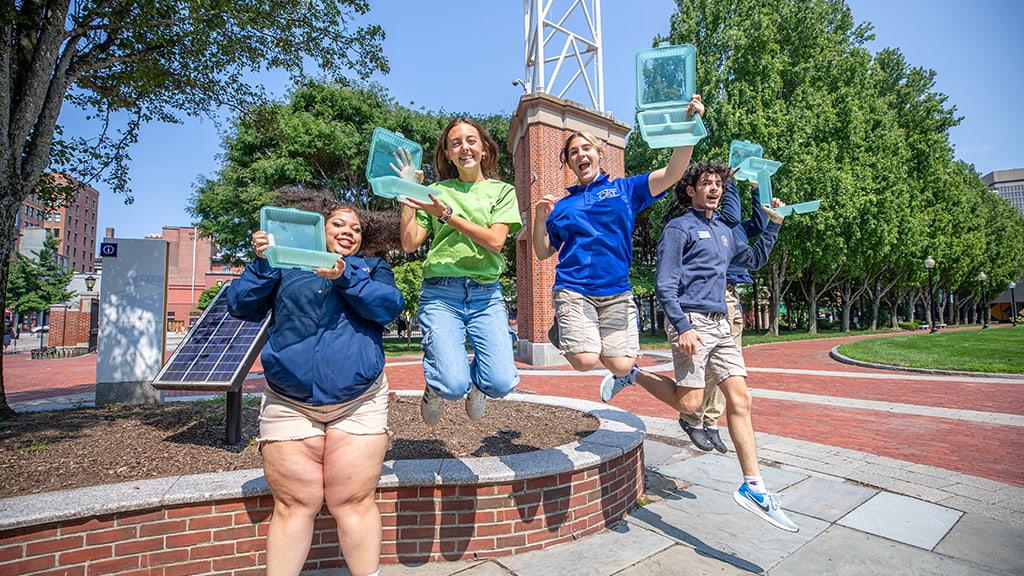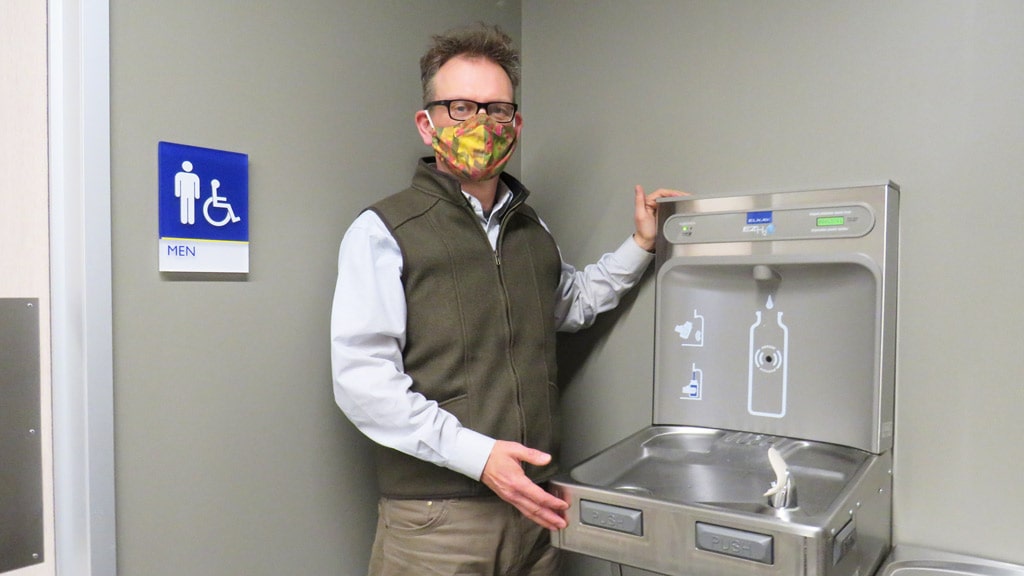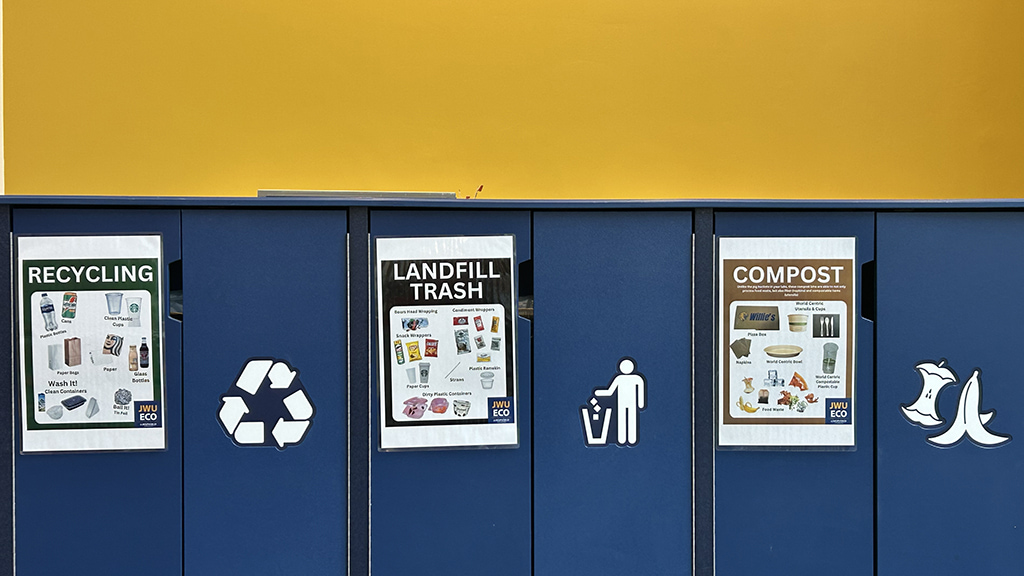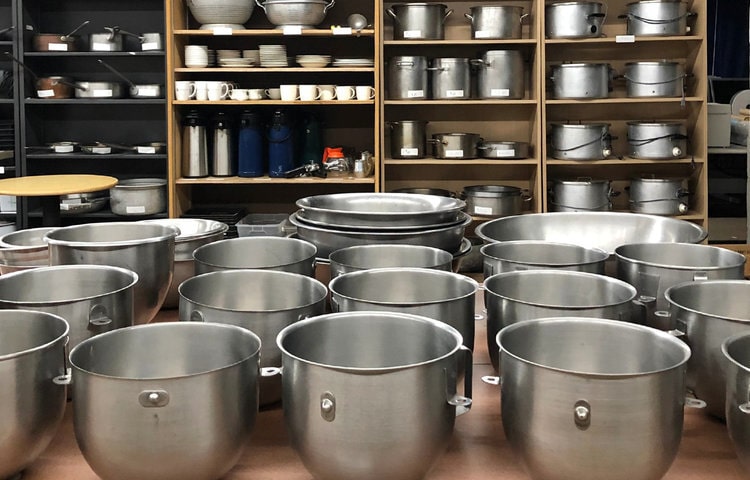The university’s extensive recycling program includes plastic films, Styrofoam, paper and plastics, metals, matresses, light fixtures and e-waste.
The university utilizes single-stream recycling in all of our campus buildings. In addition, plastic bags have been removed from campus stores, and reusable Wildcat logo tote bags are widely available.
Campus Dining Initiatives
Resuable To-Go Containers
Last fall, JWU introduced eco-friendly to-go containers at our two all-you-care-to-eat dining locations. In addition, all single-use cups were removed from Snowden. The new eco-friendly containers not only reduced food waste but also eliminated clamshells from the landfill, creating a more sustainable, efficient dining experience for students. 96,600 individual compostable clamshell containers were used in the 2024 fiscal year, which equated to 11,109 lbs. Therefore, 5.55 tons of waste was removed altogether from the waste stream once JWU stopped this purchase.
Waste Audits & Boxed Lunch Events
The ECO Team fulfills regular waste audits at high volume events on campus, as well as in dining halls, in order to identify potential improvements to dining and residence hall waste streams that will help divert waste and keep items out of the landfill. By teaming up with Campus Dining and Special Events, the ECO team has made suggestions for alternative food items, wrapping, and packaging at dining locations as well as big events on campus.
Providence Campus Dining Earns NACUFS Award
This year, Providence Campus Dining earned a bronze National Association of College and University Food Services (NACUFS) award in sustainability for waste reduction and food recovery. The team is building upon that success this year, with expanded waste diversion programs and a stronger focus on sustainable procurement.
Learn more about JWU’s sustainable dining initiatives.

Campus Donation Campaigns
Move Out & Donate is an annual event with the simple goal of getting students to donate their unwanted furniture, clothing, sheets and non-perishable food items to the right place, instead of just throwing them away when they move out. The campuswide campaign involves multiple JWU departments, including JWU ECO, Facilities, Residential Life, Student Services and more. The event is also promoted around campus and on social media with an annual design campaign created by JWU students from multiple majors.
In 2024, a total of 9,198 pounds of items were collected and donated, followed by 5,755 pounds in 2025. These contributions were distributed to Big Brothers Big Sisters and the Rhode Island Community Food Bank to serve those in need.
Move-In Day is another opportunity for JWU ECO to sort and recycle the massive amounts of plastics, cardboard, styrofoam and other materials generated during the move-in process.
ECO also coordinates with various JWU departments to reuse or recycle office furniture, desk accessories, books and other items when offices are upgraded or when staff/faculty retire or leave the university. ECO SAs help identify resuable items for the biannual Surplus Sale; books or miscellaneous items are donated to our partners, Big Brothers, Big Sisters and Savers.
Fill It Forward Program
To reduce the reliance on single-use plastic bottles for drinking, we launched the Fill It Forward program, which allows students, faculty and staff to refill their resuable water bottles at filling stations in all academic buildings and residence halls. By using the Fill It Forward app, users can track their environmental impact; each scan supports charitable sustainability initiatives.
Professor Magnus Thorsson refills his water bottle at a filling station.

Food Waste Reduction & Composting Programs
Max-R Bins
JWU ECO has installed single-stream 23-gallon recycling bins in every campus building and on multiple floor levels. In addition, 3-stream Max-R bins that separate recycling, compostable materials and landfill waste have been installed in the Bowen Center, the Harborside Academic Center, and the Friedman Center, making it easy for students, staff and faculty to properly dispose of waste.
Food Waste Composting
In November 2024, JWU partnered with Bootstrap Compost, a local composting service that processes organic food waste and material. In addition, our dining halls now utilize World Centric compostable cups, to-go containers and utensils, all of which can be disposed of in the composting bin. Bootstrap Compost does pick-ups on campus twice a week, and since launching this partnership, 5,139 pounds of compost waste has been diverted with Bootstrap alone.
Also in November 2024, ECO kick-started a volunteer compost program at Harborside Village for students living in apartment-style dorms. By April 2025, JWU students at Harborside Village had composted 756 pounds of compostable material, all of which was kept out of the landfill.
Izzo Farms Partnership
In 2014, we partnered with a local pig farmer, Izzo Farms, who regularly picks up back-of-house food scraps and organic waste from dining locations and culinary labs at the CCCE.
In 2024, 516 pickups were made from HAC, Snowden, and Harborview alone. With an estimated total of 440 pounds per pick-up, a whopping 227,040 pounds of food scrap and organic waste were collected from these three dining locations and utilized, rather than thrown into the landfill.

Plastic Film Recycling Program
In 2018, JWU Providence partnered with Trex, a composite decking material company, to recycle plastic films like shopping bags and plastic wrap. Since then, the university has collected and diverted from landfills more than 5,000 pounds of plastic, some of which was used by Trex to fabricate benches that have been installed on campus.
In the video below, watch the ECO team sorting plastic bags for recycling.
Surplus Sale
Twice a year, the ECO Office and Facilities host a surplus sale of unnecessary campus assets. This is great way to keep used but still viable items like kitchen equipment, athletic apparel, IT equipment, office furniture and much more out of the waste stream and put them into hands of our JWU community members who can use them.

Recycle A-Z 🌎
Wondering if a particular item is recyclable? Use the Rhode Island Resource Recovery Corporation’s A-Z search, which allows you to look up any item to see if it’s recyclable in RI. (Keep in mind that every state has its own guidelines.)